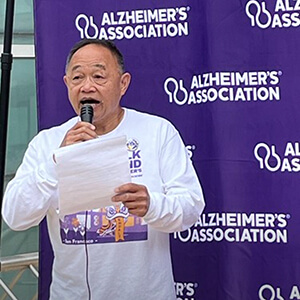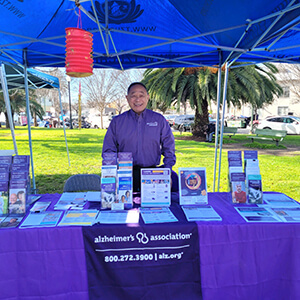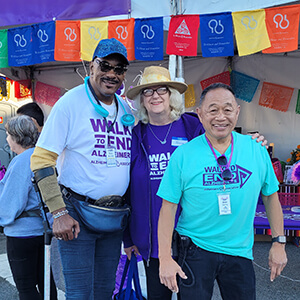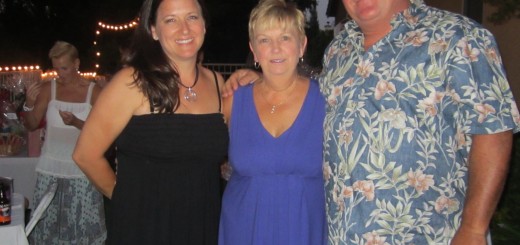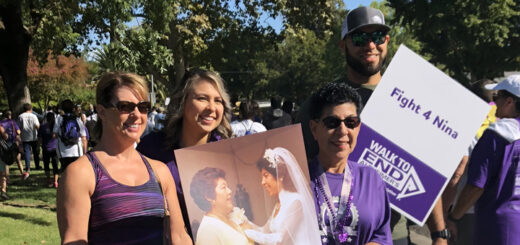Asian American son leans on support group to support his mental health
By Sharon Squires
Stan Wong’s parents both had developed cognitive impairment issues. While his mother’s cognitive issues were brought on by stroke his father’s were not. Stan was unable to get a diagnosis for his father, which took its toll on Stan and his mental health began to suffer. Through the help of a dementia support group, Stan was able to find connection and support. Today, Stan volunteers in several ways with the Alzheimer’s Association in hopes of helping others.
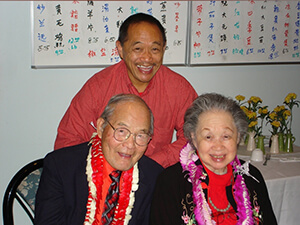
Personal Story
Stan Wong proudly identifies as a member of the LGBTQ+ (lesbian, gay, bisexual, transgender, questioning or queer) community and is no stranger to caregiving. Stan cared for his partner, who had been diagnosed with AIDS (a chronic immune system disease caused by the human immunodeficiency virus (HIV)) and died in 1997.
Although Stan knew his way around caregiving, there was no playbook for what he was about to experience in caring for a parent living with symptoms of dementia.
“My mother and father were both Chinese. My mother was from Canada, and my dad was born in China,” said Stan. “During World War II, my dad served in the 112th Cavalry for the United States Army. My mom was recruited into the Office of Strategic Services (OSS), which later became the CIA, before meeting up with her family on their way to Canada.”
Stan shared that his parents were introduced by friends and began communicating through the mail. Their first date was at the San Francisco Zoo where Bing proposed on the spot to May. They were married a few months later. The couple moved to Berkeley, California where they lived the rest of their lives.
Caregiving
In 2016 May had her first of two strokes. She experienced aphasia and went to a rehabilitation facility to learn to speak and eat again. However, May wasn’t quite the same and was showing signs of memory loss. “Once she returned home, she began exhibiting other behaviors,” said Stan. “[She would] try to get out of the house, [and had] irrational behavior. [She] become more combative which she never had before.”
Stan and his father hired a caregiver to come and help care for May. Stan said, “I hired a caregiver, but it was challenging to find one who spoke Chinese.” Stan ended up selecting a Filipino caregiver as they were unable to find a Chinese-speaking one. “She worked out very well as they traditionally have a special love and respect for older people, referring to them as ‘mama’ or ‘papa,’”
Sadly, May died after her second stroke in 2018 at the age of 97.
Normal Aging process versus Dementia
It was during this same time that Stan noticed his dad was also experiencing behavioral changes. “[He would] get up in the middle of the night and get dressed. [He] wanted to go out at 3 a.m.,” said Stan. “He started accusing the caregiver of stealing and became more paranoid.”
The Alzheimer’s Association 2024 Alzheimer’s Disease Facts and Figures report states that Asian Americans are less likely than other groups to have Alzheimer’s. This can make it harder for individuals or families to recognize the symptoms and seek professional care.
Stan took Bing to see a doctor in 2019. However, Bing had reverted to only speaking Cantonese. In addition to that, he was hard of hearing which made getting a diagnosis particularly difficult. After his doctor visit, Stan was essentially told that his father, being in his 90s, was just getting old, and this was normal.
“The doctor never said my dad [had] dementia. [The doctor] said, ‘Well, he’s old,’” recounted Stan. “The more I know, now that I work with the Association, I would have challenged what the doctor said and asked for more testing.”
Facts and Figures also states that more than half (56%) of Asian Americans believe that significant loss of memory or cognitive (such as thinking or learning) ability is a normal part of aging. At the time, Stan was unaware of the 10 signs and symptoms of dementia that could have helped him when his doctor dismissed his concerns.
Dementia Caregiver Mental Health Challenges
A missed diagnosis, like Bing’s, can impact the entire family, as it did for Stan, who felt it necessary to seek mental health support for himself. The Facts and Figures report shares that a number of potential harms may result from a missed or delayed dementia diagnosis, one being the negative impact on the family or caregiver’s physical or mental health (pg. 23).
Alzheimer’s caregivers frequently report experiencing high levels of stress. It can be overwhelming to take care of a loved one with Alzheimer’s or other dementia, but too much stress can be harmful to both the caregiver and the person living with the disease.
Facts and Figures reports that 59% of family caregivers of people with Alzheimer’s or other dementias rated the emotional stress of caregiving as high or very high (pg. 46). Additionally, the prevalence of anxiety among dementia caregivers is 44%, which is higher than that among caregivers of people with stroke (31%) (pg. 47).
Seeking Mental Support
Stan eventually joined the Open House San Francisco Alzheimer Support group. Open House partners with the Alzheimer’s Association to provide support for those in the LGBTQ+ community. There, Stan felt like he was learning skills like what to do, and how to be more proactive in caring for a person living with dementia. On top of that he was learning how to self-care techniques and improve his mental health.
While there are many things that can help with stress, here are some things Stan did to help:
- Learned about the disease
- Attended support groups
- Found quality time for himself
- Maintained his sense of humor
When Stan joined his support group, it was during the COVID-19 pandemic which meant caregivers could attend virtually instead of in-person. “It was an LGBTQ+ support group, which was nice because you could talk with other people who were dealing with their partner or parent who was living with dementia,” said Stan. “The support group gave people the freedom to share their lives.”
Stan remembered someone calling in from Texas who was new to the group. They were so grateful because they said, “I do not think we have an LGBTQ+ support group [in Texas]; this is like a breath of fresh air. Someone [in this support group] will not judge me and will understand what I am going through.”
Speaking From Experience
Stan shares, “It is so important to get involved in the support group because you need to communicate with others who are going through what you are going through and understand this. Dementia is a disease that robs the person you once knew, but they are different.
“Their life is your life now, and people need to understand this. Their reality is your reality. So, when others in a group setting hear this, they go, ‘You understand this’ and I say, ‘Yes.’ That is why reaching out to the Association is so important.”
Individuals living with Alzheimer’s dementia may develop changes in mood, personality or behavior. Symptoms include difficulty remembering recent conversations, names or events, communication problems, confusion and poor judgment.
The three most important words Stan said he learned in the group was ‘the new normal.’ “What was normal yesterday may not be their normal today,” said Stan. “As a caregiver, you must be flexible and adjust to that so they are happier and you are happier.
“You must think creatively as a caregiver so that you do not upset the person [living with the disease] and continue to respect [them],” said Stan. “Sometimes things are so in another realm that you just go, OK. We [caregivers] must find the humor, or you would go crazy because [the person living with the disease will] just do things.”
What’s Next for Stan
Bing was never formally diagnosed with dementia and, in 2021, died from complications due to pneumonia at the age of 103. Despite this, Stan continues to volunteer for the Alzheimer’s Association.
Currently, Stan is involved with Walk for Alzheimer’s in San Francisco. Stan learned a lot about Walk and the Association from his friend Joanie. They have participated in many Walks together. “Joanie has lost two sisters to Alzheimer’s disease and is currently caring for her brother with dementia,” Stan said.
After meeting Drue, the Director of the Walk to End Alzheimer’s in San Francisco, Stan was convinced to join the Walk Committee. Committee members play a vital role in the success of each event, from getting local companies involved to helping participants engage with the Alzheimer’s Association’s mission in planning the event experience.
Stan aspires to make the 2025 Walk a unique experience. For the past two years, Stan has seen the Chinese Lion Dancers perform at different community events. He is considering having the Lion Dancers come on the Walk. Stan wants the Walk to be a fun “multicultural experience,” while dealing with a complicated and sensitive subject.
Stan says, “I want to create something around a ‘remembrance theme’ that also incorporates some of Mexico’s traditions of building an altar of pictures to celebrate and honor people’s lives (those that lived with dementia).”
Volunteer Organizations
Outside of the Association, Stan is involved in several other non-profit organizations, such as the LGBTQ+ Task Force and The Bay Area Cancer Connection. Still, he continues to donate much of his time towards the many volunteer opportunities the Association offers.
In addition to being on the Walk Committee, Stan became an advocate and spoke to members of congress about ways that they can help people living with the disease. This includes getting trying to get legislation passed to help police officers and first responders get dementia training in case they come across somebody wandering or who seems confused. With this training, first responders will be better equipped to help a person living with dementia.
Stan can also be found at health fairs around the Bay Area sharing resources and information on Alzheimer’s disease. Last year, Stan became a community educator for the Association and hopes to be able to do presentations for the Asian community in the Cantonese language.
For more information on LGBTQ+ resources visit alz.org/lgbt. For information on Alzheimer’s in the Asian American and Pacific Islander Community visit alz.org/asianamerican.
To view the Alzheimer’s Association website in Chinese, please visit alz.org/Chinese.





